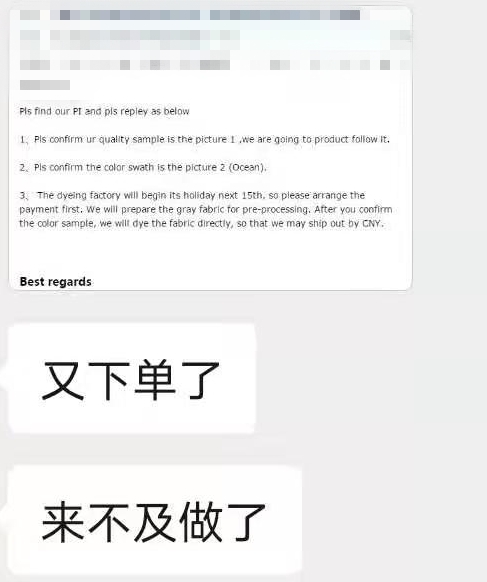Recently, some dyeing factories have announced that all dyeing fees will be settled before January 10.
Settlement of dyeing fees, payment for delivery or preparation for early holidays
On the current dyeing factories in Jiangsu and Zhejiang areas Judging from the situation, the order volume has declined compared with December, and large-volume market orders have ended. Although the market orders are coming to an end, next year’s foreign trade orders are coming one after another. Therefore, some dyeing factories with good business still need to press the card for 7-8 days. Some relatively idle dyeing factories do not need to press the card. The average delivery time is 10-10 days. around 15 days. A T800 trader revealed: “Foreign traders are currently focusing on proofing and setting out during this period, mostly to prepare for orders in the second half of next year.”
Although Jiangsu and Zhejiang have not yet clearly announced when the thermal power plant will stop However, some dyeing factories have begun to issue notices on their own to borrow money to pick up goods and settle dyeing fees. This has also made many textile people speculate whether dyeing factories are preparing to take holidays in advance.
According to a dyeing factory follower: “Last year, the dyeing factory had a lot of work that was not done before the holiday. Because workers left more often, they were released early. This year, we are afraid of the same situation, and now some remote areas have already When people return to their hometowns, they will stop coming in January. Once more people leave, the dyeing progress will be delayed, so even if the thermal power plant does not stop gas, these dyeing factories will go on holiday in advance.”
Due to the impact of the epidemic this year, rumors about the holiday time began to circulate in the market as early as more than a month ago. Earlier than in previous years, it is a general trend for dyeing factories to close holidays earlier. Although the dyeing factory has the strongest voice in the textile industry chain, everyone is generally very tight on funds this year. Once the payment is late, the customer’s cash may be given to other suppliers, and the dyeing factory can only pay the money to Pushed back. Therefore, it is not difficult to understand that some dyeing factories choose to pick up the goods and settle the dyeing fees in advance in early January.
Delivery time and quality cannot be guaranteed for orders placed years ago, so be careful when accepting orders
Recent paragraph Over time, the order frequency of foreign customers has not decreased but increased, which is also a sweet trouble for many foreign traders. On the one hand, because the RMB exchange rate remains high, sea freight has skyrocketed, and profits have been diluted a lot. On the other hand, it is due to issues such as delivery time and payment. A trader complained: “I placed an order again, it’s too late!”

The trader said that the order was placed by a customer from Bangladesh, and he was originally prepared to reject the order because the company’s orders were already saturated, and the delivery date, payment, and quality were all compromised. There was no guarantee, but the customer said he could pay in cash. After careful consideration, the company accepted the order. As for delivery time and quality, he had to work harder and go to the dyeing factory to keep a close eye on it.
Another trader who sells winter clothing fabrics made it clear that he will not accept orders after January 5. He said: “We have negotiated with the customer for 1 We will no longer accept orders after the 5th of March. It is still a matter of delivery, quality, and payment. In addition, the epidemic situation at home and abroad is unclear. If we resume work late next year and fail to meet the delivery deadline, it will not be easy to explain to customers.”
It is foreseeable that the holiday time of the entire textile market will be advanced this year. In addition, driven by the benefits of the vaccine and stocking up before the year, foreign trade customers concentrated on placing orders during this period. However, textile workers need to pay attention to the fact that taking orders before the year is relatively risky, whether in terms of capital, quality, delivery time, etc. Higher requirements have been placed on traders. Textile people need to prepare early and make the choice that suits them.
</p






